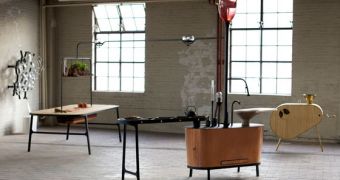Nowadays, when our natural resources face their limits, Philips shows the public opinion that a sustainable future depends on our ability of preserving food, energy and water.
Officials from Philips showcased their new invention at the Dutch Design Week. They introduced their innovative Microbial Homeon the market. In a successful attempt to provide eco-friendly solutions to all their potential buyers, Phillips has created five designs for their new bacteria-powered lamps, which are available at the Piet Hein Eek Gallery.
The company proved to be able of launching and developing innovative concepts, being one step ahead of its competitors in the industry.
The sustainable nature of their product is meant to inspire its customers, suggesting them that there is a cost-effective connection between waste, energy and recycling processes which can be added to improve our green lifestyle.
Bio Digester Kitchen Island, an essential component of the Microbial Home turns human and vegetable waste into methane which provides enough energy for the entire household. The island moves on wheels and comes with a gas stove, chopping surface and a glass monitor which indicates energy levels.
Bio-gas lamps's functioning depends on the amount of methane produced by bacteria after transforming waste.
The Larder concept reflects a special kind of table that succeeds in keeping food fresh and tasty.
The table is manufactured out of recycled wood and has the ability to preserve the quality of aliments due to its built-in terra cotta evaporative containers. Also, designers decided it would be a great idea to add to the smart table a network of hot water pipes, heated by methane, in order to keep the entire table surface warm.
Last, but not least, The Paternoster Plastic Waste-Upcycler is another breath-taking innovation which will most likely please your kids.
It is mycelium-based and manages to transform waste and used items made out of plastic into cute toys for your children. Also, manufacturers say that, somehow, the breakthrough is capable of producing edible mushrooms.
Philips designed the perfect house of the future. Not only dos it rely on awesome design, it is also 100% eco-friendly, it is all methane-powered and makes us forget that energy bills have ever existed. See you in the future!

 14 DAY TRIAL //
14 DAY TRIAL //